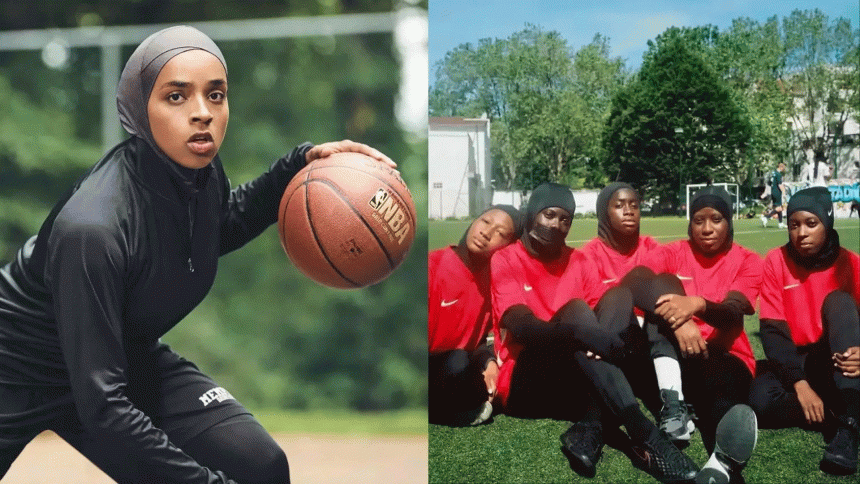'Sports should be inclusive': Activists slam France hijab ban

French Muslim basketball player Diaba Konate Tuesday said she had hoped to represent her country at the Paris Olympics but did not stand a chance because she wears a headscarf.
"Despite my desire and skills, I'm... not actually allowed to play for France because of discriminatory policies," the 24-year-old said during a press conference organised by rights groups to urge France to overturn bans on the Muslim headscarf in sport.
"It's very frustrating to be excluded from representing my home country... simply because of my religious identity," said the athlete who has played on France's national youth team and has a career in college basketball in the United States.
"I strongly believe that sports should be inclusive," she said.
France has invoked its strict rules on secularism to ban its athletes from wearing religious symbols during the Paris Olympics from July 26 to August 11.
This has barred French women wearing a headscarf from competing at the international event, on top of their being excluded from soccer and basketball tournaments nationwide.
The Sport & Rights Alliance -- whose partners include Human Rights Watch and Amnesty International -- on Tuesday called for an end to what it described as discriminatory bans.
It said it had called on the International Olympic Committee to show "its commitment to gender equality" in the run-up to the Games and put pressure on the French authorities, but had not received a response.
In a letter to the IOC dated May 24 and shown to the press on Tuesday, it urged the Olympics body "to publicly call on sporting authorities in France to overturn all bans on athletes wearing the hijab in French sport, both at Paris 2024 and at all times and all levels of sport".
This "would ensure that the Olympics leave a long-lasting and meaningful legacy for the values of dignity and equality," said the alliance's director Andrea Florence.
'Hypocrisy'
France's laws on secularism are intended to keep the state neutral in religious matters, while guaranteeing citizens the right to freely practice their religion.
They prohibit pupils and teachers in schools as well as civil servants from wearing "ostentatious" religious symbols.
Beyond the Olympics, women athletes are allowed to wear the head scarf in some sports but not in others.
Last year, France's highest administrative court upheld a ban on women footballers wearing the hijab despite FIFA allowing head coverings since 2014.
And the French Basketball Federation has also banned the headscarf during competitions, whereas the International Basketball Federation FIBA has permitted it since 2017.
The Paris region in October cut funding from clubs not respecting the rule.
"The girls are disgusted," said Timothee Gauthierot, a basketball coach in the Paris region and co-founder of the Basket pour Toutes (Basketball for All) activist group.
"Already some girls have stopped doing sport. It's having an impact on their physical and mental health," he said.
"It's dramatic just weeks ahead of the Olympics, which are supposed to be popular games for everyone.... There's a paradox, a hypocrisy," he added.
He explained that, despite basketball rules forbidding all religious symbols like the Jewish kippa or Sikh turban, they seemed particularly targeted at the Muslim hijab.
"I don't know players who wear the kippa," he said.
"But I do know Sikh players who wear a turban... They're still playing and they haven't been banned from the court."

 For all latest news, follow The Daily Star's Google News channel.
For all latest news, follow The Daily Star's Google News channel. 








Comments